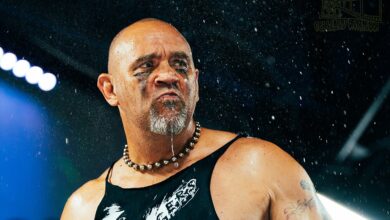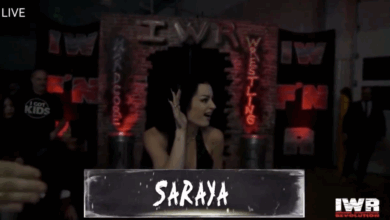Wrestling & Mental Health: Next Moves
If you saw Ryan Nemeth’s video last week, you saw AEW’s latest effort in its commendable promotion of mental health. Powerhouse Hobbs, Vickie Guerrero, Dax Harwood, Amanda Huber and The Blade shared about their personal mental health experiences and what they find helpful. Here I provide additional knowledge about the topics discussed in the video to benefit those within wrestling and outside of it.
GRIEF
Hobbs, Guerrero and Huber all spoke about losing loved ones. Grieving is a normal human process that can occur after loss (for instance, the loss of a relationship), though it is most associated with deaths of those we loved. In popular lore, there are “stages of grief.” People do process their grief in a variety of ways, but scientific research does not support that there is a set sequence of stages one must pass through when grieving. My healthy grieving may look different than yours.
Having social support when grieving can be extremely helpful, and formal treatment is often not necessary. That said, ideally, counseling and therapy should always be accessible to someone grieving. Research I have conducted with colleagues indicates that grief counseling helps folks who seek it out, but it may be unhelpful and even potentially harmful when it is forced on someone.
In some cases, the loss of loved ones can lead to mental health problems like clinical depression, substance use disorders and posttraumatic stress disorder (PTSD). While not specifically mentioning loss, The Blade stated in Nemeth’s video that he experiences depression. I’ve written elsewhere about treatments for depression and substance use disorders, but one takeaway message for each is that effective treatment can include many different options. For alcohol use disorder, some folks with alcohol problems improve from outpatient rather than inpatient treatment, and they may choose “moderate drinking” as a goal for treatment rather than total abstinence. For depression, therapy and medications are roughly equally effective, and many therapy options work about equally well. As we will see, the treatment picture for PTSD looks different, but is still optimistic.
TRAUMA AND PTSD
Some losses may be sudden and unexpected. If a loved one or close friend’s death was accidental or violent, it is a potentially traumatic event. Potentially traumatic events, which can also include events like being nearly killed, being sexually assaulted, witnessing someone else be killed, and so on, are not uncommon; three-quarters or more of the population will experience at least one in their lifetime. Powerhouse Hobbs’ reflections indicated he has experienced such events.
Most people who experience potentially traumatic events will not experience lasting mental health problems from them. Humans are surprisingly resilient, and usually heal from trauma without doctors. However, a minority of the population will experience a diagnosable mental health problem. They are unlucky; they are not weak, deficient or to blame.
Among those who develop mental health problems, clinical depression is more common than PTSD, but as mentioned earlier, PTSD treatment differs from depression treatment in important ways.
Medication can be effective at treating PTSD; however, this is a problem for which therapy normally works better. Specifically, there are two forms of cognitive behavioral therapy (CBT) for PTSD that scientific research indicates work: Prolonged Exposure and Cognitive Processing Therapy. Prolonged Exposure involves systematically experiencing the memories and emotions associated with the potentially traumatic event rather than trying to constantly “push them out of one’s head.” Cognitive Processing Therapy includes some of this, too, but focuses on changing how one thinks about the event and its consequences. My colleagues’ and my research about therapies that work finds that Prolonged Exposure and Cognitive Processing Therapy are among the most scientifically credible therapies for any mental health problem.
ANXIETY
I have written about clinical anxiety and its treatment before, but treatments that work exist whether your anxiety includes panic attacks (as Dax Harwood mentioned), excessive worry, or both (as The Blade suggested). Anxiety can benefit from medication, particularly worry-based anxiety. Anxiety can also benefit from CBT. CBT can help someone come to see their anxiety as uncomfortable but not dangerous, decatastrophize their anxious predictions about the future, and accept that anxious thoughts will occur without giving them too much power. A therapist using systematic exposure—that is, teaching a client how to experience the emotions and physical sensations of anxiety in a particular way—is especially useful for treating sharp, panic-like anxiety. CBT also helps individuals to better engage in activities their anxiety may have been leading them to avoid or that they may have participated in only with extreme discomfort (for example, wrestling in front of a crowd).
WHAT WRESTLING PROMOTIONS CAN DO
The best actions a wrestling company can take regarding mental health are proactive rather than reactive. AEW and Ryan Nemeth’s video normalizes wrestlers seeking support. AEW and other wrestling companies can make accessing mental health treatment as seamless, discrete, and inexpensive as possible for wrestlers. They should make wrestlers aware of how to obtain care so that when wrestlers choose to access help, they can do so with minimal fuss. Wrestling companies should also avoid company-wide “crisis debriefings” and other questionable mental health practices in the aftermath of tragic events. Wrestling promotions cannot control everything that happens in life, but they can put systems in place to support wrestlers when the slings and arrows of life inevitably come their way.
Dr. Alex Williams is a licensed clinical psychologist and teaching professor at the University of Kansas. He is a designer of the Rampage Wrestling computer game. Alex conducts scientific research on the credibility of evidence for different psychotherapies. In addition to publishing his research in academic journals, he has bylines with the Scientific American, Aeon Magazine, the Wrestling Observer, and the Pro Wrestling Torch. A TEDx Talk speaker, Alex can be reached on Twitter @williamspsych or via email at alexwilliams123 [at] gmail [dot] com.
This article does not constitute professional mental health advice; for more information on psychological treatments that work, see the Society of Clinical Psychology. If you or someone you know is suicidal or experiencing a mental health crisis, call National Suicide Prevention Lifeline at 1- 800-273-8255.



